- Home
- Fay Weldon
Darcy's Utopia: A Novel Page 14
Darcy's Utopia: A Novel Read online
Page 14
Q: Valerie has asked me if you could answer a few questions on her behalf. She is getting on well with Lover at the Gate, but sometimes the clues you provide are, well, enigmatic. Of course my piece will be very different from Valerie’s: I wouldn’t want you to think there was duplication: that we were taking up your time unnecessarily.
Hugo was beginning to feel oppressed by his surroundings. The shiny black sofa, the shabby furniture, the dull suburban road the other side of a forlorn garden, seemed some kind of irony. He did not believe Eleanor Darcy lived here. She merely pretended to; he felt the minute he left she and Brenda packed up themselves and the children and took off to more exotic surroundings. Yet was not this how most of the world lived, and thought themselves lucky to do so?—once survival was accomplished the struggle for ordinariness began.
A: You mean Valerie wants to know more about the role of children in Darcy’s Utopia? I thought she would.
Q: Well, you did speak of selection. Her liberal antennae were alerted.
A: Tell her all babies will be automatically aborted unless good reason can be shown why they should be allowed to proceed to term.
Q: Isn’t that a little drastic?
A: Yes. Even in Darcy’s Utopia it will take quite some getting used to. The decision to ‘choose’, or not to ‘choose’ will be taken away from the parents and left to an ad-hoc committee of neighbours. Are these two (or this one) not so much capable of loving a baby, as of being worthy of a baby’s love? If the verdict is that they are not, there can be no baby. Down the plughole with it, this little glob of potential life, this putative devourer of the world’s resources! The root of delinquency, the alienation, the violent and despairing habits of today’s young, has very little to do with the fact that their parents failed to love them—most adults look round quite desperately for something, anything to coo over, however erratically—but that their parents failed to be worthy of their love. Babies are born with a sense of fairness, justice, morality, and a great capacity for kindness and forbearance, and it is sheer disappointment in the character and nature of parent and world that changes this eager infant into a murderous teenager. Some survive, of course: time heals a few wounds, wounds a few heels. The teenager gets older, encounters some nicer, more controlled, more kindly people than he or she ever found at home—most people behave worst in their own homes—and with any luck comes to understand, yes, there is an aspiration or so floating around out there, and, if he, she, hasn’t seen too many horror movies, been too beaten up in body and mind, regains a little faith in a world at least potentially redeemable. He, she, grows up into a mortgage-paying, law-abiding adult who at least wants to give his, her, own children a better chance. And may or may not have the resolution, the constancy, so to do. Not to love, which is easy, but to be in truth, in fact, in deed, lovable. I hear the divorced parent saying, ‘Oh, the kids are all right. They know I love them,’ but it isn’t true. The kids are not all right. You may love the kids, but you are not worthy of their love. You look after yourself, not them. You have betrayed them, and they hate you for it.
Q: Well, that is a matter of opinion. And this notion of an ad-hoc committee of neighbours, with power of life and death, is surely very eccentric.
A: What are juries but ad-hoc committees of neighbours? Juries saw no problem deciding whom they were to despatch from this world: let similar bodies decide who is to come into it.
Q: It seems to me that the citizens of Darcy’s Utopia are going to be kept very busy.
A: Indeed. Idleness, in this nation of no work, will not be encouraged. There will be no ‘training in leisure’. Darcians will be hard at work, repairing the past, safeguarding the future; they will have no need of theme parks. Darcy’s Utopia has a Mission Statement, as does any corporate enterprise in the business world. ‘We are working towards a secular, unicultural, multiracial society.’ When citizens are called upon to make up their minds, pass laws or make regulations—their decisions will be infused with the light cast by this statement, and so by and large will work towards this end. It may be hard to take a step in the right direction, but it will be still harder to take a step in the wrong. We have a time scale, too. We give ourselves two hundred years to achieve it. If it doesn’t work, we rethink.
Q: Secular? But isn’t religion a civilizing force? Aren’t many of our social problems due to the decline of religion?
A: Now look. Nice orderly home-and-family-loving people are the ones who believe in God and even still go to church. They are nice people: they believe that everything ought to be fair, that is to say that virtue is rewarded and villainy punished. Since they can’t see it happening on earth they invent a heaven in which it does. And a kind of consensus develops amongst right-minded people in your neighbourhood, that if you keep to certain rules and rituals then by God, by magic, you’ll get to heaven, you won’t even have to die. Eat the wafer, chant the lyric, bow to Mecca: please God and he’ll be kind. But these people are not nice, orderly, home-and-family-loving because they believe in God. The temperament comes first. Acknowledging God is effect, not cause. And institutionalize the religion, any religion, and you’re in trouble. Nice people become guilty people, cruel people, unhappy people, trapped in belief structures their temperaments don’t agree with, taught peculiar beliefs in school, threatened by hell and afflicted by superstition. And what terrible damage they do, have done through the centuries, from the Inquisitor General to Stalin, to your young neighbour in the IRA who believes in the Catholic God and uses that to justify his murdering you in your bed, to the Mullah who whips up the faithful to civil strife in the name of Allah, to the Moonie who steals your children’s money and affections.
People like rules: it is not good for them to have them. The individual must come to his, her, own decision as to where morality lies. Do what you like in your own home, worship whatever God you please, but shut up about it in public. In Darcy’s Utopia church services of various denominations will exists and blind eyes will no doubt be turned. Common sense will prevail. But the jury of neighbours who decide upon your fertility might not look too kindly upon you if they think you are going to bring up your children as Jehovah’s Witnesses or Servants of Baal, or use the terror of hell as a way of controlling them: or beat the soles of their feet if they get the Koran wrong.
Q: Won’t terrible injustices ensue?
A: Chance and luck will be a factor in Darcy’s Utopia, as elsewhere. But good luck attends the happy. Darcians will try to be happy, to avoid self-righteousness. The self-righteous seldom smile.
Q: Would you describe yourself as happy?
A: I’m getting there. I don’t have children, which makes it easier. To have these hostages to fortune wipes the smile from many a woman’s face. Consider Brenda. In Darcy’s Utopia parents will have some reassurance in the fact that at least the neighbours thought they were fit to rear children: some of the responsibility for failure, should failure there be, ‘will rest with the community. But I like to think the neighbours, the ten just persons, men and women both, who have seen you in the shops, who have watched you cross a road, who understand your body language, will make the right decision.
Q: Could we get back to this uniculture of yours? Don’t you mean monoculture?
A: No. Monoculture assumes the domination of the single majority culture: that ‘they’ will be subsumed into ‘us’. That the eaters of curry must learn to love fish and chips, that husbands of four must become husbands of one, that young blacks must drive cars in the fashion of elderly whites: that the custom and laws of the majority will prevail. In a uniculture this is not the case. A uniculture is a matter for rational decision: we will be prepared to make value judgements. Better a culture in which men have one wife and women need not shroud themselves in black, we’ll say. Or perhaps we won’t. Better one in which marriages are arranged than left to love. Let us all sing the Darcian Anthem every morning at ten a.m. Let men wear skirts, not women trousers. Let us all change our names four time
s in our lives. Let us take our education in our middle not our opening years. Or whatever is decided. And if it doesn’t work, we’ll change it. And if you don’t like it, you can live somewhere else. And we might even divide Darcy’s Utopia into four and have a different Mission Statement in each, and citizens can move to the one they prefer: or work to change the one they’re in, if they prefer. Oh yes, Darcy’s Utopia will be all freedom and hard work, and all alive and energetic with a perpetual sense of achievement. Who will need religion when heaven is here on earth?
Q: This unicultural society of yours. Isn’t it going to be rather dull? What about the richness, the diversity of the multicultural society in which all decent non-racist folk take such pleasure?
A: Goodness, how you do sometimes remind me of Bernard! How all-pervasive is the orthodoxy of right-thinking people. I have never heard a member of an ethnic minority obliged to dwell within the barbarous framework of a powerful, prosperous, white, allegedly Christian culture talk about the richness of the multicultural society. That is left for members of the host community to do, as it busies itself ghettoizing the minority; and as it ghettoizes it mumbles, and if you listen carefully you can just discern beneath the self-righteousness, the self-congratulation, the following: ‘Okay, okay, so you were having a hard time in your own country. You poor things! Come over here and join us by all means—but not too many of you, so we’ll vet you as you come in; and not make getting in pleasant or easy; and just please stick to your own districts, and keep your own religion and dance away to tambourines, or bow to the East, or whatever you like to do to remind you of home—or home as it used to be a hundred years ago but certainly isn’t now—and aren’t we clever, and kind, and good, the way we give you your roots back?, and with any luck your children will grow up well-behaved and pleasant; ours certainly aren’t; because your children come of a society which, being somewhere else and a long time ago, is probably better than ours. And speak your own language, please: we’ll even teach it to you in our schools to prove how understanding we are, just so long as you do our dirty work for less wages than our own kind are prepared to accept: just so long as you keep yourselves to yourselves, and don’t let your children marry ours, because what we’re all terrified of, so terrified the word’s gone out of the vocabulary. Let me whisper, can you hear? MISCEGENATION. The mixture of races! The future, in other words.’
In Darcy’s Utopia no one is frightened of the future. We welcome it. Because this is the world’s future, and we must hurry towards it with open and welcoming arms. There will be no black, no white, no yellow; no Asiatic, no Caucasian; we will all, individually, be multiracial, multicultural; and then indeed there will be a wonderful diversity, and God’s will done upon earth. So don’t come to me, Mr Hugo Vansitart, with your ‘rich diversity of language and culture’. The richness and diversity will be when your grandchildren, your great grandchildren, are of mixed race, mixed ancestry: look at each other with fondness and love out of eyes which slant every which way and who compare the shade of their skins with interest, not envy: because the paler the skin no longer means the longer-lived, the more prosperous, the more educated, the more capable of reaching the fullness of human potential. And when that has happened, why, we might be able to invent a God as good, as moral, as human beings. That is quite enough for today.
Q: Could I just ask, before I go? You have on occasion referred to someone called Nerina—
A: Is your tape switched off? Good. Nerina remains off the record. Things are stirred up enough as they are, don’t you think? Nerina was someone—is someone—whom Bernard tried to help. He shook religion out of her mind, as it were, and into the vacuum rushed something rather disagreeable. Nerina is a very pretty, very bright girl; of Muslim background, though no one in the family actually ever went to a mosque—well, only her brother. You know how fanatical the young can be. Unfortunately and unwittingly Bernard angered her. And that is why Julian is in prison. And why I sit here, husbandless, dependent upon social security supplemented by such pitiful amounts of money as I can wring out of the national press, and Bernard genuflects once more, fled back to his baptismal church, terrified by the very notion of living outside it. All this, you might say, was Nerina’s fault—if only it was not clear to me that Nerina was the symptom, not the disease: the pustule, not the pox: that to this end, without need of her intervention, all would still have come. It is a terrible thing to laugh a person out of faith.
Q: A woman’s faith, too?
A: As I said, the greater includes the lesser.
Q: When you say that I think you’re laughing at me.
A: Now why should I do a thing like that? You are the most serious person in the world, Hugo, with your very neat suit, your very quiet tie, your hotel laundered shirt. I can tell from its whiteness, its crispness. Let me feel! Yes. You have to be careful of hotel cleaners: things come back very white, but don’t last long. Perhaps Valerie would wash them for you? Sometimes they have little bottles of stuff called Softwash on hotel shelves, which the guests take with them on leaving. Shall we go to the pub and have a drink?
Valerie is shocked
WHAT ELEANOR DARCY HAS to say is of course monstrous, fascist. Babies, aborted compulsorily in the womb! What about the woman’s right to choose, forget the baby’s right to life? Though Eleanor Darcy denies the very concept of ‘right’. ‘It would be nice if only’ is her replacement of the term, and I can see the point in that.
Babies selected to live by friends and neighbours! Who’d ever agree to that? What government would even dare? It is true, of course, that women would be spared the agony of choice. I think about my friend Erin, as I often do. She has a Down’s syndrome baby. We all knew it would be disastrous; we foretold that her husband would walk out, that her other children would suffer: we saw she was the only one of the family unit who couldn’t bear not to see the fruit of her womb, however sour, ripen, drop and live. And that’s how it turned out: the child, now twelve, is badly retarded, Erin is no more than its nurse; she manages without a husband, her other children are spiteful and embarrassed. Erin talks about the joy the mindless child brings her—well, so it may, but her love for it has been most destructive for others. Left to us, friends and family, we would have said no, Erin, sorry, not for you. This baby you insist on having keeps other babies out, ones which won’t cause this distress to you and yours. Just not this one; Erin, try again. All women have as many babies as they can manage: four, three, two, one, none at all: as many as they can afford—physically, emotionally, practically. I managed two. A woman spends years saying no, not this one, stay out of my bed: I’ll wait, a better man will come along: and with the better man a better baby. Let’s hope, here’s hoping he comes along! The lover at the gate is the father at the gate. Where is he? I’ll wait, yes I’ll wait, for a baby I can feed better, love better, provide running water for, give a father to, who stays around and bounces babies on his knee. To this end she stays a virgin, or practises abstinence, or contraception, or if things get further in spite of her best endeavours—for both men and her own desires are importunate—terminates. If she didn’t, she’d have babies annually from puberty until death by childbirth around the age of thirty or so. How it must have been for our Stone Age grandmothers—swell, oh, oh, pop, look, a little one—oh, it’s dead—oh, I’m dying, dying; dead! And even now we get it wrong; how often, for all our knowledge, we get it wrong. Choose a husband who leaves, a father who doesn’t provide; the genes don’t match, the conjunction goes wrong—the wrong baby at the wrong time; oh, bad luck! My neighbours, my friends, why did you not save me from this?
It wouldn’t all be negative. My other friend Edie gave birth to a baby with one leg. It showed up in the scan—one child in three, they say, is now born with some imperfection or other, mostly minor, sometimes major, and whether that’s due to pollution, or insecticides, or growth hormones, or radon gas, or nuclear power plants, take your choice, take your pick: and whatever the cause, the mothers st
ay healthy enough, are sufficiently medicated one way or another to bring babies to term—and we all said to Edie, what’s a missing leg? Keep this baby, look after this baby, you have a great husband, the other kids aren’t the kind to care, and we were right. It was okay. This child has a metal prosthesis and kicks hell out of the others at football. Of course he’d be happier if he had two legs, so would she, so would everyone, but he’d rather live with one leg than not live at all. We did know. We are born into a group, not just into a family, not just to an individual woman. Let the group decide. Ten good neighbours and true.
It isn’t the perfect way; it remains horrible, but the lesser of many evils. In Darcy’s Utopia it has to be. All babies terminated unless validated. What happens otherwise in our two-hundred-year, five-hundred-year plan? Can we wait for prosperity and education to keep mankind in check; so the humble villager, the wretched dweller in the shantytown doesn’t choose the traditional, unthinking, long-term option of a dozen children, the decision which in the long term destroys both them and theirs? We have lost that race: we must face it. It is all paradox, this business of procreation!
Every way we look we see a barrier and on the wall is written ‘No! Immoral! Unkind! Fascist!’ Everything but the free flow of natural selection is disagreeable to so much as contemplate, but the planet sinks beneath the weight of us, stinks because of the shit of us; if we don’t do something we all go down together, gasping for air, for heaven’s blessing. Governments do what they can. Time and time again they fail. Let neighbours, simple neighbours, try and do better. Meeting their quota, their too-small-for-comfort quota, always with generosity, understanding and compassion, understanding as a group what the individual woman knows by instinct, that this child, by existing, keeps that other child out.
Hugo says I am so persuasive in convincing myself on this subject he begins to wonder who it is who speaks through Eleanor Darcy, is it God or the Devil? This is quite an advance on his initial assumption that poor Julian Darcy, the Rasputin of Bridport, economic theorist and prisoner of his nation’s conscience, victim of its guilt, indolence and fear, is the motivating force behind Darcy’s Utopia. But how about the side benefits! How religiously, if only in order to obviate neighbourly interference, the Darcian woman would observe contraceptive precautions! If she wanted a baby, what a good neighbour she would be, if only to keep in well with them: how she would feed her neighbours’ cats, take in her neighbours’ mail, refrain from drunken disturbance! My Sophie, for example—if she were in Darcy’s Utopia and in a couple of years were to become a teenage primigravida, which is perfectly on the cards—I reckon the neighbours would know better than Lou or me if she was fit to be a mother or not. As it is, it’s the family who takes responsibility for denying the baby existence, though permitting its death rather than allowing its life. ‘Family physicians’ enjoy the most extraordinary regard in our society: somewhere in our joint head we need to see them as knowing, honest, trustworthy, benign and caring folk—the truth of the matter being that they are as forgetful, spiteful and drunk as the next person—and as likely to grow old, lecherous and incompetent as anyone else. Your family doctor may know one end of a thyroid gland from another—with any luck—but no especial wisdom is granted him because he sits in a surgery seeing one coughing person after another all day; peering into ears and wombs and hearing tales of insomnia and worms. I have been indecently assaulted by many a wise old family physician in my time: the passion for mammary examination—which has saved almost no lives at all over the past few years, it now appears—has been fomented and encouraged by male doctors. I wish Hugo would come back. My thoughts are growing wild. He somehow nails me, pins me, centres me in one spot like a butterfly spread for inspection, wonderful, beautiful; he steadies me. This time he did not want to make love to me when he dropped the tapes off, and in truth I was a little tired. It would be nice to have some conversation as well as sex—dinner out somewhere, say. But his editor had to see him.

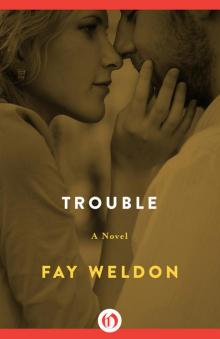 Trouble
Trouble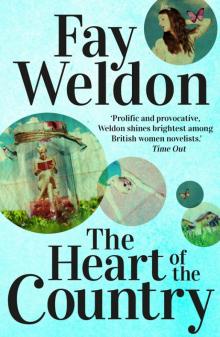 The Heart of the Country
The Heart of the Country Wicked Women
Wicked Women Mischief
Mischief Long Live the King
Long Live the King Remember Me
Remember Me Worst Fears
Worst Fears Chalcot Crescent
Chalcot Crescent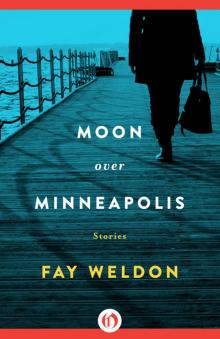 Moon Over Minneapolis
Moon Over Minneapolis The New Countess
The New Countess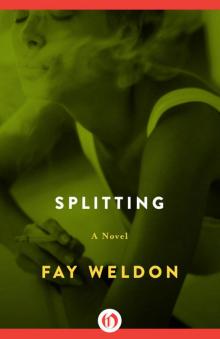 Splitting
Splitting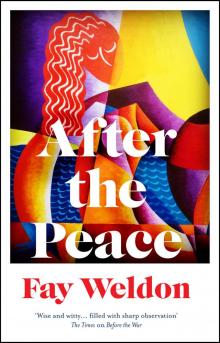 After the Peace
After the Peace Habits of the House
Habits of the House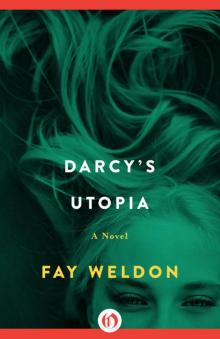 Darcy's Utopia
Darcy's Utopia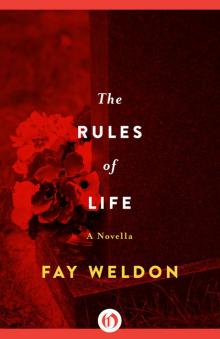 The Rules of Life
The Rules of Life Kehua!
Kehua! Before the War
Before the War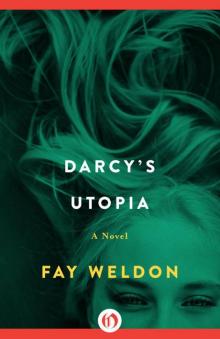 Darcy's Utopia: A Novel
Darcy's Utopia: A Novel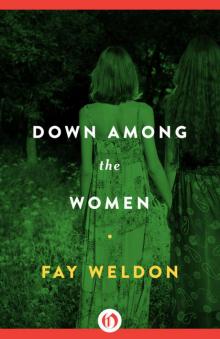 Down Among the Women
Down Among the Women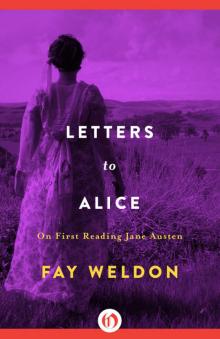 Letters to Alice
Letters to Alice 3 Great Historical Novels
3 Great Historical Novels Female Friends
Female Friends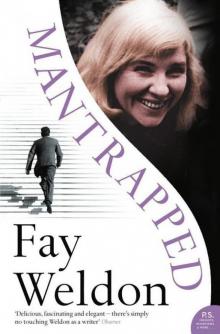 Mantrapped
Mantrapped The Bulgari Connection
The Bulgari Connection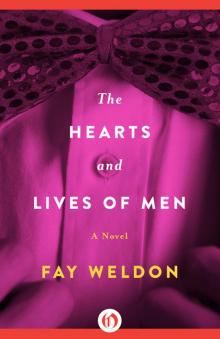 The Hearts and Lives of Men
The Hearts and Lives of Men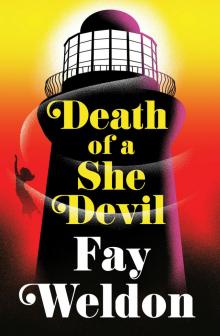 Death of a She Devil
Death of a She Devil